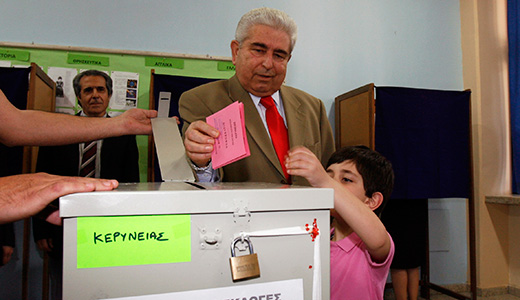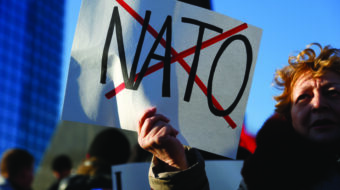
In parliamentary elections May 22 in the island nation of Cyprus, the governing AKEL party – the island’s Communist Party – gained seats and increased its voting percentage.
AKEL, the Progressive Party of Working People, increased its representation by one seat over the 2006 elections, for a total of 19 seats in the 56-member House of Representatives, as the body is called. Its percentage of the vote also increased to 32.67 percent.
Those elected included AKEL General Secretary Andros Kyprianou and the head of the party’s International Relations Department, George Loukaides. The president of Cyprus, Dimitris Christofias, elected in 2008, was previously AKEL general secretary.
AKEL’s good showing can in part be attributed to the hard work of the party’s rank and file who, before the election, knocked on virtually every door in Cyprus.
But credit also is due to the pro-people program that the AKEL government has implemented since 2008. One measure that stands out is the increase in the minimum wage to a level, which, dollar for dollar, is actually slightly higher then that in the U.S.
Cypriot President Christofias has said that Cyprus will never adapt anti-people policies as a response to the global capitalist economic crisis.
But despite AKEL’s good results, its partner in the governing coalition, the Democratic Party or DIKO, lost 2 seats and now holds 9, giving the AKEL-DIKO coalition a total of 28 seats. And the right-wing opposition Democratic Rally party known as DISY gained 2 seats, for a total of 20 seats, one more than AKEL. In addition, the Social Democratic Party EDEK, and the European Party or EVROKO, a right-wing splinter off DISY, won 5 and 2 seats respectively.
Following the election, the right-wing DISY began to maneuver to have a candidate of its choice elected as president of the new House.
First it tried to convince the Democratic Party to leave the government and join it in an anti-AKEL coalition. That effort to split the governing coalition failed.
So DISY leaders turned to AKEL, proposing a presidency which would rotate between them. AKEL rejected this proposal.
Then DISY approached the Social Democrats in another attempt to cobble together an anti-AKEL coalition. DISY was able to find common cause with them by promising to support their candidate. Even with their support and the more obvious support of the right-wing EVROKO Party the rightist DISY-led coalition still did not have enough votes to elect a House President.
Consequently, enormous pressure was put on a right-wing DIKO deputy. The deputy yielded to this pressure and, as a result the Social Democrats’ Yiannakis Omirou was elected president of the Parliament, by one vote. The erstwhile DIKO deputy, Zaharias Koulia, who broke ranks, has been expelled from the party and DIKO’s leader has demanded that he resign from Parliament.
Political observers in Cyprus believe that the right wing’s real goal is to oust Communist President Christofias in 2013 and elect DISY leader Nicos Anastasiades in his place in 2013. But the Social Democratic EDEK may prove to be an unreliable partner for such a venture. The two would seem to be a political odd couple to begin with and EDEK has demonstrated its willingness to break with coalition partners. Only time will tell if this most recent “marriage of convenience” will last.
Photo: Cyprus President Dimitris Christofias, with his grandson Dimitris, casts his ballot at a polling station in Nicosia, the capital, during the May 22 parliamentary elections. (AP/Philippos Christou)

MOST POPULAR TODAY


Zionist organizations leading campaign to stop ceasefire resolutions in D.C. area

High Court essentially bans demonstrations, freedom of assembly in Deep South

Communist Karol Cariola elected president of Chile’s legislature

Afghanistan’s socialist years: The promising future killed off by U.S. imperialism






Comments